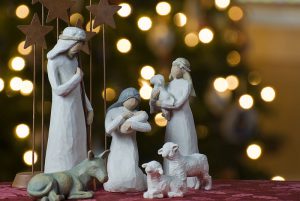
圣诞
圣体不是选民的麦子和生命的食粮吗?而麦子是必须被种植的。 它须落在土中,长起来,长熟了,被收割和被磨碎后, 才能做成好的面饼。…这天上的麦子被种植在解作「面饼房子」的「 白冷」。…白冷建筑在面对着耶路撒冷的山上。当这枚麦子长熟了, 便要上加尔瓦略山,在哪儿被磨碎,用苦难的火烘焙, 而成为生命的食粮。…耶稣在白冷像出生在马糟的一只羊, 在母亲身边生长,由圣母用她纯洁童贞的母乳喂养, 并保留到祭献的一天。牺牲的特色在我主身上如此明显, 当祂初公开传教时,洗者若翰遇到祂,称呼祂的不是别的名字, 而是天主的羔羊:「请看,除免世罪的天主羔羊!」… 在白冷开始的牺牲,弥撒圣祭中在祭台上完成。… 再看圣体怎样在白冷开始,祂生为厄玛奴尔, 意思是天主与我们同在;祂是要来居住在祂人民中间的那位。 在第一个圣诞日,祂开始了住在我们中间, 而在圣体中达成了永远临在。在白冷圣言成了肉;在圣体圣事, 为了把祂的肉给我们吃而不令我们产生抗拒的感觉, 祂成了面饼形的食粮。(圣艾伯铎 St. Peter Julian Eymard 1811-1868)
我们会羡慕那些前往白冷山洞看圣婴的牧人,他们亲吻圣婴的小手, 送给他礼物。我们会惊叹:「有福的牧人啊!」然而, 我们不需羡慕他们,因为我们也沾著同样的福气。 牧人们到山洞探望的,和现在在圣体龛内的,是同一个主耶稣。 唯一的不同,牧人是用肉体的眼睛看衪, 我们却是用信德的眼睛看衪。耶稣最喜悦的,是我们常去看望他。( 圣若望鲍思高神父, 1815-1888)
耶稣为了我们从天降来,而我们连去探望在圣体内的耶稣也嫌麻烦, 这样做合理吗,值得原谅吗?(圣金口若望, 344-407)
贤士们朝拜马槽中的圣婴,他们怀着敬畏之情叩首在地敬拜, 你现在瞻仰在祭台上的,就是贤士们朝拜在马槽中的那位, 而你亦明白祂的大能!(圣金口若望, 344-407)
看,每日他自我谦卑,如同当他由天上的王座, 来到了贞女的胎中时;每日他以谦卑的外表,来我们这里。 每日他从天父的怀里下降,到祭台上在司铎的手中。(圣方济. 亚西西, 1182-1226)
圣女日多达曾在领圣体前问耶稣:「主啊,你要给我什么礼物呢?」 耶稣回答说:「给你整个我,连同我的天主性, 正如我的童贞母亲曾接收的。」(圣女日多达, 1256-1302)
耶稣向真福富高说:「我以不可想像的美善, 不单在我降生时把我自己给你数小时或数年而已,我现仍在你手中, 我会留下,直到世界的终结。想想我诞生带给你的无尽福气, 你能为我服务,可以透过服务你的近人来为我服务, 也可以服务那就住在你附近圣体龛中的我。你不但能服务我, 你更能安慰我。我成为这么细小、这么温柔和的幼儿,向你呼唤: 放心靠近我吧!不要怕我,走过来,给我小孩子需要的:爱的拥抱。 不要害怕,不要畏惧一个在你眼前的温和婴儿,一个伸开双手给你、 向着你微笑的婴儿。他就是你的天主,但他是充满微笑和温良。 不要惊怕。」(真福查理.富高, 1858-1916)
Christmas
What is the Eucharist but “the wheat of the elect” and “the living bread?” Now, wheat must be sown. It must fall into the soil, and spring up, and ripen, and be harvested, and be ground before it can be made into good bread. … This heavenly wheat was sown at Bethlehem, the “House of bread.”… Bethlehem is built on a hill facing Jerusalem. When this ear of wheat has ripened, it shall lean towards Calvary where it shall be ground and shall be set on the fire of suffering to become a living bread. … It was truly a lambkin that was born at Bethlehem. Jesus was born like a lamb in a stable, and like a lamb knew no one but His mother. ... This little Lamb was to grow up close to its Mother; ... She would feed it with her pure and virginal milk, and would preserve it, for the day of sacrifice. This characteristic of victim was so evident in our Lord that when St. John the Baptist saw Him in the early days of His public life, he had no other name for Him than that of “Lamb of God.” “Behold the Lamb of God, behold Him Who takes away the sin of the world.” … The sacrifice begun at Bethlehem is consummated on the altar at Holy Mass. … And see how the Eucharist began at Bethlehem. He was even then the Emmanuel, “God with us,” Who was come to dwell among His people. On the first Christmas Day He began to live in our midst; the Eucharist perpetuates His presence. At Bethlehem, the Word was made flesh; in the Sacrament He is made bread in order to give us His flesh without stirring any feeling of repugnance in us. (St. Peter Julian Eymard 1811-1868)
We envy the shepherds who went to visit the grotto of Bethlehem to see Him, kissed His little hand, and offered Him their gifts. “Lucky shepherds!” we exclaim. And yet there is no reason to envy them, for their fortune is ours, too. The same Jesus they visited in the grotto is in our tabernacle. The only difference is that the shepherds saw Him with the eyes of the body, whereas we see Him with the eyes of faith. Nothing will please Him more than our frequent visits to Him. (St. John Bosco, 1815-1888, feast Jan 31)
What excuse shall we have, or how shall we obtain pardon, if we consider it too much to go to Jesus in the Eucharist, who descended from Heaven for our sake? (St. John Chrysostom, 344-407, feast Sept 13)
The wise men adored this body when it lay in the manger;…they prostrated themselves before it in fear and trembling….Now you behold the same body that the wise men adored in the manger, lying upon the altar;…you also know its power. (St. John Chrysostom, 344-407, feast Sept 13)
Everyday, Jesus humbles himself just as He did when He came from His heavenly throne into the Virgin’s womb; everyday He comes to us and lets us see Him in abjection, when He descends from the bosom of the Father into the hands of the priest at the altar. (St. Francis Assisi, 1182-1226, feast Oct 4)
As St. Gertrude was about to receive the Sacred Host, she asked “O Lord, what gift are You going to grant me?” And Jesus answered, “The gift of My Whole Being with My Divine nature, as formerly my Virgin Mother received it.” (St. Gertrude, 1256-1302, feast Nov 16)
Jesus speaking to Blessed Charles - “In my unimaginable goodness, I did not merely give myself to you at my birth for a few hours or years: I am still in your hands, and shall be henceforth until the end of the world. Think of the unending good fortune I brought you in my birth: the ability to serve me—to serve me by serving your neighbor, to serve me myself, living there near you in the tabernacle. Not only can you serve me, you can also console me… How happy you should be to be able to console me at every moment of your lives! By becoming so small, so gentle a child, I was crying out to you: Have trust! Come close to me! Do not be afraid of me, come to me, give me what children need: loving embraces. Do not be afraid, do not be so frightened in the presence of such a gentle baby, smiling at you and holding out his arms to you. He is your God, but he is all smiles and gentleness. Do not be afraid” (Bl. Charles de Foucauld, 1858-1916, feast Dec 1)
Inspriration from all walks of life
